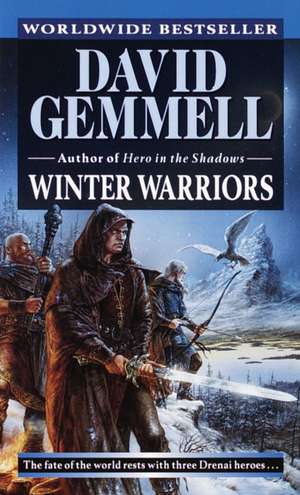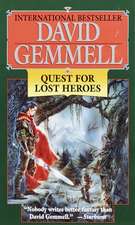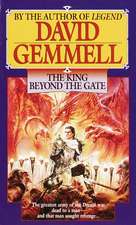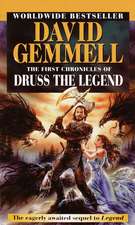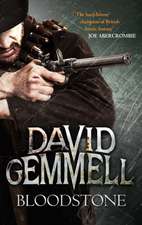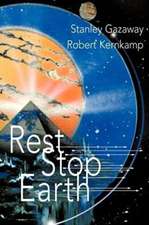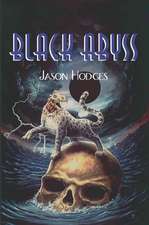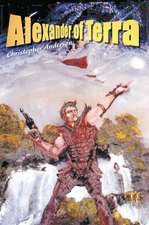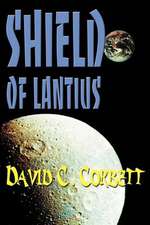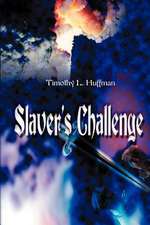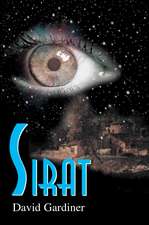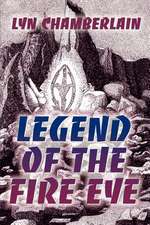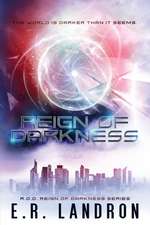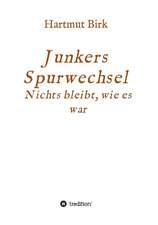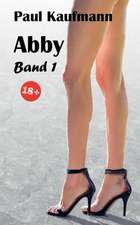Winter Warriors: Drenai Sagas
Autor David Gemmellen Limba Engleză Paperback – 31 mai 2000
Two of the kings are already dead. For the prophesy to be fulfilled, spreading carnage across the world, the Demon Lord must sacrifice the third king: Queen Axiana's unborn child.
When Emperor Skanda disbands his army, the pregnant queen takes flight, pursued by the Lords of the Undead. All hope lies with three ancient heroes, though discarded by the emperor, they are still Drenai soldiers: Bison the giant, Kebra the bowman, and the great swordsman Nogusta - the Demon Lord's greatest foe. But will these warriors - once the best in the land - be enough to stem the tide of gruesome horror that threatens to envelop the world?
| Toate formatele și edițiile | Preț | Express |
|---|---|---|
| Paperback (2) | 53.13 lei 3-5 săpt. | |
| Del Rey Books – 31 mai 2000 | 53.13 lei 3-5 săpt. | |
| Transworld Publishers Ltd – oct 1997 | 58.40 lei 26-32 zile | +20.84 lei 10-14 zile |
Preț: 53.13 lei
Nou
Puncte Express: 80
Preț estimativ în valută:
10.17€ • 10.48$ • 8.59£
10.17€ • 10.48$ • 8.59£
Carte disponibilă
Livrare economică 08-22 februarie
Preluare comenzi: 021 569.72.76
Specificații
ISBN-13: 9780345432308
ISBN-10: 0345432304
Pagini: 352
Dimensiuni: 111 x 176 x 25 mm
Greutate: 0.17 kg
Ediția:American.
Editura: Del Rey Books
Seria Drenai Sagas
ISBN-10: 0345432304
Pagini: 352
Dimensiuni: 111 x 176 x 25 mm
Greutate: 0.17 kg
Ediția:American.
Editura: Del Rey Books
Seria Drenai Sagas
Notă biografică
David Gemmell was born in London, England, in the summer of 1948. Expelled from school at sixteen, he became a bouncer working nightclubs in Soho. Born with a silver tongue, Gemmell rarely needed to bounce customers, relying on his gift of gab to talk his way out of trouble. This talent eventually led to a job as freelancer for the London Daily Mail, Daily Mirror, and Daily Express. His first novel, Legend, was published in 1984 and has remained in print ever since. He became a full-time writer in 1986.
Extras
THE NIGHT SKY over the mountains was clear and bright, the stars like diamonds on sable. It was a late winter night of cold and terrible beauty, the snow hanging heavy on the branches of pine and cedar. There was no color here, no sense of life. The land lay silent except for the occasional crack of an overladen branch or the soft, whispering sound of fallen snow being drifted by the harsh north wind.
A hooded rider on a dark horse emerged from the tree line, his mount plodding slowly through the thick snow. Bent low over the saddle, he rode on, his head bowed against the wind, his gloved hands holding his snow-crowned gray cloak tightly at the neck. As he came into the open, he seemed to become a focus for the angry wind, which howled around him. Undaunted, he urged the horse on. A white owl launched itself from a high treetop and glided down past the horse and rider. A thin rat scurried across the moonlit snow, swerving as the owl's talons touched its back. The swerve almost carried it clear.
Almost.
In this frozen place "almost" was a death sentence. Everything here was black and white, sharp and clearly defined, with no delicate shades of gray. Stark contrasts. Success or failure, life or death. No second chances, no excuses.
As the owl flew away with its prey, the rider glanced up. In a world without color his bright blue eyes shone silver-gray in a face as dark as ebony. The black man touched heels to his tired mount, steering the animal toward the woods. "We are both tired," whispered the rider, patting the gelding's long neck. "But we'll stop soon."
Nogusta looked at the sky. It was still clear. No fresh snow tonight, he thought, which meant that the tracks they were following would still be visible come dawn. Moonlight filtered through the tall trees, and Nogusta began to seek a resting place. Despite the heavy hooded gray cloak and the black woolen shirt and leggings, he was cold all the way to the bone. But it was his ears that were suffering the most. Un-der normal circumstances he would have wrapped his scarf around his face. Not a wise move, however, when tracking three desperate men. He needed to be alert for every sound and movement. These men had already killed and would not hesitate to do so again.
Looping the reins over his pommel, he lifted his hands to his ears, rubbing at the skin. The pain was intense. Do not fear the cold, he warned himself. The cold is life. Fear should come only when his body stopped fighting the cold, when it began to feel warm and drowsy. For death's icy dagger lay waiting within that illusory warmth. The horse plodded on, following the tracks like a hound. Nogusta hauled him to a stop. Somewhere up ahead the killers would be camped for the night. He sniffed the air but could not pick up the scent of woodsmoke. They would have to light a fire. Otherwise they would be dead.
Nogusta was in no condition to tackle them now. Swinging away from the trail, he rode deeper into the woods, seeking a sheltered hollow or a cliff wall where he could build his own fire and rest.
The horse stumbled in deep snow but steadied itself. Nogusta almost fell from the saddle. As he righted himself, he caught a glimpse of a cabin wall through a gap in the trees. Almost entirely snow-covered, it was nearly invisible, and if the horse had not balked, he would have ridden past it. Dismounting, Nogusta led the exhausted gelding to the deserted building. The door was hanging on one leather hinge, the other having rotted away. The cabin was long and narrow beneath a sod roof, and there was a lean-to at the side, out of the wind. There Nogusta unsaddled the horse and rubbed him down. Filling a feedbag with grain, he looped it over the beast's ears, then covered his broad back with a blanket.
Leaving the horse to feed, Nogusta moved around to the front of the building and eased his way over the snow that had piled up in the doorway. The interior was dark, but he could just make out the gray stone of the hearth. As was customary in the wild, a fire had been laid, but snow had drifted down the chimney and half covered the wood. Carefully Nogusta cleaned it out, then relaid the fire. Taking his tinderbox from his pouch, he opened it and hesitated. The tinder would burn for only a few seconds. If the thin kindling wood did not catch fire immediately, it might take him hours to start a blaze with knife and flint. And he needed a fire desperately. The cold was making him tremble now. He struck the flint. The tinder burst into flame. Holding it to the thin kindling wood, he whispered a prayer to his star. Flames licked up, then surged through the dry wood. Nogusta settled back and breathed a sigh of relief, and as the fire flared, he looked around, studying the room. The cabin had been neatly built by a man who had cared. The joints were well crafted, as was the furniture: a bench table, four chairs, and a narrow bed. Shelves had been set on the north wall. They were bare now. There was only one window, the shutters closed tight. One side of the hearth was filled with logs. An old spiderweb stretched across them.
The empty shelves and lack of personal belongings showed that the man who had built the cabin had chosen to move on. Nogusta wondered why. The construction of the cabin showed a neat man, a patient man, not one to be easily deterred. Nogusta scanned the walls. There was no sign of a woman's presence there. The builder had been a man alone. Probably a trapper. And when he had finally left--perhaps the mountains were trapped out--he had carefully laid a fire for the next person to find his home. A considerate man. Nogusta felt welcome in the cabin, as if greeted by the owner. It was a good feeling.
A hooded rider on a dark horse emerged from the tree line, his mount plodding slowly through the thick snow. Bent low over the saddle, he rode on, his head bowed against the wind, his gloved hands holding his snow-crowned gray cloak tightly at the neck. As he came into the open, he seemed to become a focus for the angry wind, which howled around him. Undaunted, he urged the horse on. A white owl launched itself from a high treetop and glided down past the horse and rider. A thin rat scurried across the moonlit snow, swerving as the owl's talons touched its back. The swerve almost carried it clear.
Almost.
In this frozen place "almost" was a death sentence. Everything here was black and white, sharp and clearly defined, with no delicate shades of gray. Stark contrasts. Success or failure, life or death. No second chances, no excuses.
As the owl flew away with its prey, the rider glanced up. In a world without color his bright blue eyes shone silver-gray in a face as dark as ebony. The black man touched heels to his tired mount, steering the animal toward the woods. "We are both tired," whispered the rider, patting the gelding's long neck. "But we'll stop soon."
Nogusta looked at the sky. It was still clear. No fresh snow tonight, he thought, which meant that the tracks they were following would still be visible come dawn. Moonlight filtered through the tall trees, and Nogusta began to seek a resting place. Despite the heavy hooded gray cloak and the black woolen shirt and leggings, he was cold all the way to the bone. But it was his ears that were suffering the most. Un-der normal circumstances he would have wrapped his scarf around his face. Not a wise move, however, when tracking three desperate men. He needed to be alert for every sound and movement. These men had already killed and would not hesitate to do so again.
Looping the reins over his pommel, he lifted his hands to his ears, rubbing at the skin. The pain was intense. Do not fear the cold, he warned himself. The cold is life. Fear should come only when his body stopped fighting the cold, when it began to feel warm and drowsy. For death's icy dagger lay waiting within that illusory warmth. The horse plodded on, following the tracks like a hound. Nogusta hauled him to a stop. Somewhere up ahead the killers would be camped for the night. He sniffed the air but could not pick up the scent of woodsmoke. They would have to light a fire. Otherwise they would be dead.
Nogusta was in no condition to tackle them now. Swinging away from the trail, he rode deeper into the woods, seeking a sheltered hollow or a cliff wall where he could build his own fire and rest.
The horse stumbled in deep snow but steadied itself. Nogusta almost fell from the saddle. As he righted himself, he caught a glimpse of a cabin wall through a gap in the trees. Almost entirely snow-covered, it was nearly invisible, and if the horse had not balked, he would have ridden past it. Dismounting, Nogusta led the exhausted gelding to the deserted building. The door was hanging on one leather hinge, the other having rotted away. The cabin was long and narrow beneath a sod roof, and there was a lean-to at the side, out of the wind. There Nogusta unsaddled the horse and rubbed him down. Filling a feedbag with grain, he looped it over the beast's ears, then covered his broad back with a blanket.
Leaving the horse to feed, Nogusta moved around to the front of the building and eased his way over the snow that had piled up in the doorway. The interior was dark, but he could just make out the gray stone of the hearth. As was customary in the wild, a fire had been laid, but snow had drifted down the chimney and half covered the wood. Carefully Nogusta cleaned it out, then relaid the fire. Taking his tinderbox from his pouch, he opened it and hesitated. The tinder would burn for only a few seconds. If the thin kindling wood did not catch fire immediately, it might take him hours to start a blaze with knife and flint. And he needed a fire desperately. The cold was making him tremble now. He struck the flint. The tinder burst into flame. Holding it to the thin kindling wood, he whispered a prayer to his star. Flames licked up, then surged through the dry wood. Nogusta settled back and breathed a sigh of relief, and as the fire flared, he looked around, studying the room. The cabin had been neatly built by a man who had cared. The joints were well crafted, as was the furniture: a bench table, four chairs, and a narrow bed. Shelves had been set on the north wall. They were bare now. There was only one window, the shutters closed tight. One side of the hearth was filled with logs. An old spiderweb stretched across them.
The empty shelves and lack of personal belongings showed that the man who had built the cabin had chosen to move on. Nogusta wondered why. The construction of the cabin showed a neat man, a patient man, not one to be easily deterred. Nogusta scanned the walls. There was no sign of a woman's presence there. The builder had been a man alone. Probably a trapper. And when he had finally left--perhaps the mountains were trapped out--he had carefully laid a fire for the next person to find his home. A considerate man. Nogusta felt welcome in the cabin, as if greeted by the owner. It was a good feeling.
Recenzii
"David Gemmell tells a tale of very real adventure, the stuff of true epic fantasy."
-R. A. SALVATORE
Author of the DemonWars trilogy
-R. A. SALVATORE
Author of the DemonWars trilogy
Textul de pe ultima copertă
Winged demons gather, silent and unseen, above the city of Usa, their talons long and sharp. Their purpose is clear, as is the prophesy: Upon the deaths of the three kings, the demon riders of the Krayakin will become flesh, free to slake their thirst with human blood -- and the stench of evil will cover the land.
Two of the kings are already dead. For the prophesy to be fulfilled, spreading carnage across the world, the demon lord must sacrifice the third king: Queen Axiana's unborn child.
When Emperor Skanda disbands his army, the pregnant queen takes flight, pursued by the Lords of the Undead. All hope lies with three ancient heroes. Though discarded by the emperor, they are still Drenai soldiers: Bison the giant, Kebra the Bowman, and the great swordsman Nogusta -- the demon lord's greatest foe. But will these warriors -- once the best in the land -- be enough to stem the tide of gruesome horror that threatens to envelop the world?
Descriere
Winged demons with sharp talons gather above the city of Usa, awaiting a prophecy. Upon the death of the three kings, the Demon Riders of the Kraykin will become flesh, free to slake their thirst with human blood. All hope lies with three ancient heroes discarded by the king. But are they enough to quell the gruesome horror that awaits?
